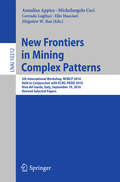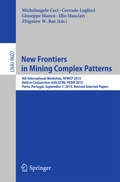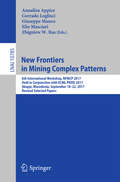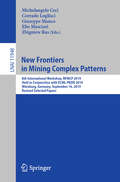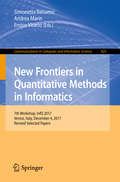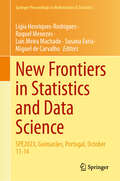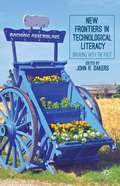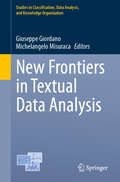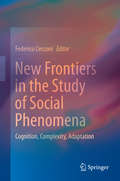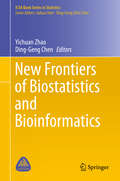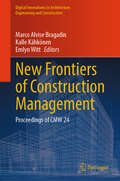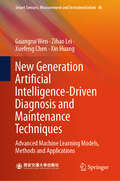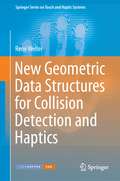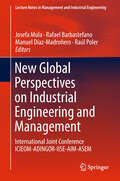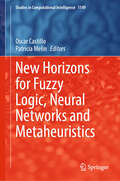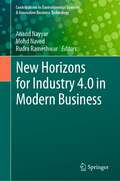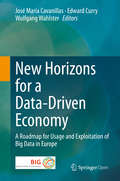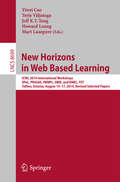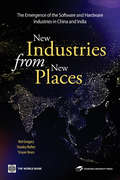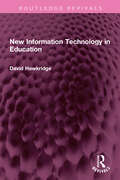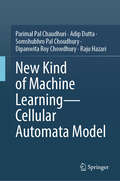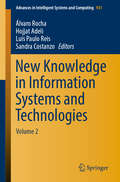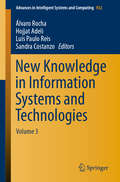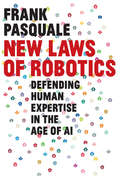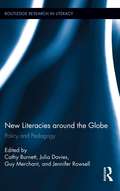- Table View
- List View
New Frontiers in Mining Complex Patterns
by Annalisa Appice Michelangelo Ceci Corrado Loglisci Elio Masciari Zbigniew W. RaśThis book constitutes the thoroughly refereed post-conference proceedings of the 4th International Workshop on New Frontiers in Mining Complex Patterns, NFMCP 2015, held in conjunction with ECML-PKDD 2015 in Porto, Portugal, in September 2015. The 15 revised full papers presented together with one invited talk were carefully reviewed and selected from 19 submissions. They illustrate advanced data mining techniques which preserve the informative richness of complex data and allow for efficient and effective identification of complex information units present in such data. The papers are organized in the following sections: data stream mining, classification, mining complex data, and sequences.
New Frontiers in Mining Complex Patterns
by Michelangelo Ceci Corrado Loglisci Giuseppe Manco Elio Masciari Zbigniew W. RasThis book constitutes the thoroughly refereed post-conference proceedings of the 4th International Workshop on New Frontiers in Mining Complex Patterns, NFMCP 2015, held in conjunction with ECML-PKDD 2015 in Porto, Portugal, in September 2015. The 15 revised full papers presented together with one invited talk were carefully reviewed and selected from 19 submissions. They illustrate advanced data mining techniques which preserve the informative richness of complex data and allow for efficient and effective identification of complex information units present in such data. The papers are organized in the following sections: data stream mining, classification, mining complex data, and sequences.
New Frontiers in Mining Complex Patterns: 6th International Workshop, NFMCP 2017, Held in Conjunction with ECML-PKDD 2017, Skopje, Macedonia, September 18-22, 2017, Revised Selected Papers (Lecture Notes in Computer Science #10785)
by Annalisa Appice Corrado Loglisci Giuseppe Manco Elio Masciari Zbigniew W. RasThis book features a collection of revised and significantly extended versions of the papers accepted for presentation at the 6th International Workshop on New Frontiers in Mining Complex Patterns, NFMCP 2017, held in conjunction with ECML-PKDD 2017 in Skopje, Macedonia, in September 2017. The book is composed of five parts: feature selection and induction; classification prediction; clustering; pattern discovery; applications.The workshop was aimed at discussing and introducing new algorithmic foundations and representation formalisms in complex pattern discovery. Finally, it encouraged the integration of recent results from existing fields, such as Statistics, Machine Learning and Big Data Analytics.
New Frontiers in Mining Complex Patterns: 8th International Workshop, NFMCP 2019, Held in Conjunction with ECML-PKDD 2019, Würzburg, Germany, September 16, 2019, Revised Selected Papers (Lecture Notes in Computer Science #11948)
by Michelangelo Ceci Corrado Loglisci Giuseppe Manco Elio Masciari Zbigniew RasThis book constitutes the refereed post-conference proceedings of the 8th International Workshop on New Frontiers in Mining Complex Patterns, NFMCP 2019, held in conjunction with ECML-PKDD 2019 in Würzburg, Germany, in September 2019. The workshop focused on the latest developments in the analysis of complex and massive data sources, such as blogs, event or log data, medical data, spatio-temporal data, social networks, mobility data, sensor data and streams.
New Frontiers in Quantitative Methods in Informatics: 7th Workshop, Infq 2017, Venice, Italy, December 4, 2017, Revised Selected Papers (Communications In Computer And Information Science #825)
by Simonetta Balsamo Andrea Marin Enrico VicarioThis book constitutes the refereed proceedings of the 7th Workshop on New Frontiers in Quantitative Methods in Informatics, InfQ 2017, held in Venice, Italy, in December 2017.The 11 revised full papers and the one revised short paper presented were carefully reviewed and selected from 22 submissions. The papers are organized in topical sections on networking and mobile applications; applications of quantitative modeling; big data processing and IoT; theory, methods and tools for quantitative analysis.
New Frontiers in Statistics and Data Science: SPE2023, Guimarães, Portugal, October 11-14 (Springer Proceedings in Mathematics & Statistics #469)
by Lígia Henriques-Rodrigues Miguel De Carvalho Raquel Menezes Luís Meira Machado Susana FariaThis volume showcases a collection of thirty-two peer-reviewed articles presented at the XXVI Congress of the Portuguese Statistical Society (2023). It covers a wide range of cutting-edge topics in both theoretical and applied statistics. Each contribution highlights the latest advancements and research in the field, offering valuable insights and innovative methodologies for researchers and practitioners alike. Readers with a background in mathematics and statistics will find it particularly beneficial, while researchers from various scientific disciplines can explore numerous robust applications.
New Frontiers in Technological Literacy
by John DakersThis book attempts to rethink the concept of technological literacy in a modern context, not only in terms of a subject area taught in schools, but also as an important general concept that all citizens should engage with. As this book will illustrate, the concept of technological literacy has no universally agreed definition.
New Frontiers in Textual Data Analysis (Studies in Classification, Data Analysis, and Knowledge Organization)
by Michelangelo Misuraca Giuseppe GiordanoThis volume presents a selection of articles which explore methodological and applicative aspects of textual data analysis. Divided into four parts, it begins by focusing on statistical methods, and then moves on to problems in quantitative language processing. After discussing the challenging task of text mining in relation to emotional and sentiment analyses, the book concludes with a collection of studies in the social sciences and public health which apply textual data analysis methods.The refereed contributions were originally presented at the 16th International Conference on Statistical Analysis of Textual Data (JADT 2022), which took place in Naples, Italy, on July 6-8, 2022. The biennial JADT meeting discusses theories, problems, and practical uses of textual data analysis in various fields, sharing a quantitative approach to the study of lexical, textual, pragmatic or discursive features of information expressed in natural language.
New Frontiers in the Study of Social Phenomena: Cognition, Complexity, Adaptation
by Federico CecconiThis book studies social phenomena in a new way, by making judicious use of computer technology. The book addresses the entire spectrum of classic studies in social science, from experiments to the computational models, with a multidisciplinary approach. The book is suitable for those who want to get a picture of what it means to do social research today, and also to get an indication of the major open issues. The book is connected to a database of code for simulations, experimental data and allows to activate a subscription to a teaching tool using NetLogo, a programming language widely used in the social studies. The authors are researchers with first-hand experience research projects, both basic and applied. The work will be useful for those who want to understand more of the social, economic and political phenomena via computer applications.
New Frontiers of Biostatistics and Bioinformatics (ICSA Book Series in Statistics)
by Ding-Geng Chen Yichuan ZhaoThis book is comprised of presentations delivered at the 5th Workshop on Biostatistics and Bioinformatics held in Atlanta on May 5-7, 2017. Featuring twenty-two selected papers from the workshop, this book showcases the most current advances in the field, presenting new methods, theories, and case applications at the frontiers of biostatistics, bioinformatics, and interdisciplinary areas.Biostatistics and bioinformatics have been playing a key role in statistics and other scientific research fields in recent years. The goal of the 5th Workshop on Biostatistics and Bioinformatics was to stimulate research, foster interaction among researchers in field, and offer opportunities for learning and facilitating research collaborations in the era of big data. The resulting volume offers timely insights for researchers, students, and industry practitioners.
New Frontiers of Construction Management: Proceedings of CMW 24 (Digital Innovations in Architecture, Engineering and Construction)
by Kalle Kähkönen Marco Alvise Bragadin Emlyn WittThis book comprises the select proceedings of the 3rd Construction Management Workshop (CMW 24), New Frontiers of Construction Management, held in Ravenna, Italy on November 7-8, 2024. It highlights key research topics that could be drivers of change and innovation in the management of the construction and building processes in its various stages, including design, construction, operation and maintenance, disposal and reuse. It represents a contribution to the debate and an introduction to new methods and tools addressing building production and management. The contributions focus on the use of methodologies for Construction Project Management, especially those that have witnessed recent developments because of the digitalization of building processes, the use of Artificial Intelligence and the search for environmental sustainability. Topics include AI and Digitalization of building processes, Building Information Modelling and Built Heritage, Construction Project Management and Lean Construction, Off-site Construction, Occupational Health and Safety management, Environmental impacts, Circular Economy, Low carbon, Life Cycle Assessment in construction projects.
New Generation Artificial Intelligence-Driven Diagnosis and Maintenance Techniques: Advanced Machine Learning Models, Methods and Applications (Smart Sensors, Measurement and Instrumentation #46)
by Xuefeng Chen Xin Huang Guangrui Wen Zihao LeiThe intelligent diagnosis and maintenance of the machine mainly includes condition monitoring, fault diagnosis, performance degradation assessment and remaining useful life prediction, which plays an important role in protecting people's lives and property. In actual engineering scenarios, machine users always hope to use an automatic method to shorten the maintenance cycle and improve the accuracy of fault diagnosis and prognosis. In the past decade, Artificial Intelligence applications have flourished in many different fields, which also provide powerful tools for intelligent diagnosis and maintenance. This book highlights the latest advances and trends in new generation artificial intelligence-driven techniques, including knowledge-driven deep learning, transfer learning, adversarial learning, complex network, graph neural network and multi-source information fusion, for diagnosis and maintenance of rotating machinery. Its primary focus is on the utilization of advanced artificial intelligence techniques to monitor, diagnose, and perform predictive maintenance of critical structures and machines, such as aero-engine, gas turbines, wind turbines, and machine tools. The main markets of this book include academic and industrial fields, such as academic institutions, libraries of university, industrial research center. This book is essential reading for faculty members of university, graduate students, and industry professionals in the fields of diagnosis and maintenance.
New Geometric Data Structures for Collision Detection and Haptics
by René WellerStarting with novel algorithms for optimally updating bounding volume hierarchies of objects undergoing arbitrary deformations, the author presents a new data structure that allows, for the first time, the computation of the penetration volume. The penetration volume is related to the water displacement of the overlapping region, and thus corresponds to a physically motivated and continuous force. The practicability of the approaches used is shown by realizing new applications in the field of robotics and haptics, including a user study that evaluates the influence of the degrees of freedom in complex haptic interactions. New Geometric Data Structures for Collision Detection and Haptics closes by proposing an open source benchmarking suite that evaluates both the performance and the quality of the collision response in order to guarantee a fair comparison of different collision detection algorithms. Required in the fields of computer graphics, physically-based simulations, computer animations, robotics and haptics, collision detection is a fundamental problem that arises every time we interact with virtual objects. Some of the open challenges associated with collision detection include the handling of deformable objects, the stable computation of physically-plausible contact information, and the extremely high frequencies that are required for haptic rendering. New Geometric Data Structures for Collision Detection and Haptics presents new solutions to all of these challenges, and will prove to be a valuable resource for researchers and practitioners of collision detection in the haptics, robotics and computer graphics and animation domains.
New Global Perspectives on Industrial Engineering and Management: International Joint Conference ICIEOM-ADINGOR-IISE-AIM-ASEM (Lecture Notes In Management And Industrial Engineering Ser.)
by Josefa Mula Raúl Poler Manuel Díaz-Madroñero Rafael BarbastefanoThis book presents the proceedings of the 3rd International Joint Conference – ICIEOM-ADINGOR-IISE-AIM-ASEM (IJC2017) “XXIII International Conference on Industrial Engineering and Operations Management”, “International ADINGOR Conference 2017”, “International IISE Conference 2017”, “International AIM Conference 2017” and “International ASEM Conference 2017”, which took place at UPV (Universitat Politècnica de València) from July 6th to 7th, 2017. This joint conference is the result of an agreement between ABEPRO (Associação Brasileira de Engenharia de Produção), ADINGOR (Asociación para el Desarrollo de la Ingeniería de Organización), IISE (Institute of Industrial and Systems Engineers), AIM (European Academy for Industrial Management) and ASEM (American Society for Engineering Management).Consisting of papers on new global perspectives on industrial engineering and management, the book offers an interdisciplinary view of industrial engineering and management. The topics covered include: strategy and entrepreneurship, quality and product management, modelling and simulation, knowledge and project management, logistics, as well as production, information and service systems.
New Horizons for Fuzzy Logic, Neural Networks and Metaheuristics (Studies in Computational Intelligence #1149)
by Oscar Castillo Patricia MelinThis book contains a collection of papers focused on hybrid intelligent systems based on soft computing techniques. In this book, new horizons on the theoretical developments of fuzzy logic, neural networks and optimization algorithms are envisioned. In addition, the abovementioned methods are discussed in application areas such as control and robotics, pattern recognition, medical diagnosis, decision-making, prediction and optimization of complex problems. There are a group of papers with the main theme of type-1, type-2 and type-3 fuzzy systems, which basically consists of papers that propose new concepts and algorithms based on type-1, type-2 and type-3 fuzzy logic and their applications. There is also a group of papers that offer theoretical concepts and applications of meta-heuristics in different areas. Another group of papers outlines diverse applications of hybrid intelligent systems in real problems. There are also a group papers that present theory and practice of neural networks in different applications. Finally, there are papers that offer theory and practice of optimization and evolutionary algorithms in different application areas.
New Horizons for Industry 4.0 in Modern Business (Contributions to Environmental Sciences & Innovative Business Technology)
by Anand Nayyar Rudra Rameshwar Mohd NavedThis book discovers what it will take to reindustrialize the previous industrial powerhouses in order to offset the advantages of cheap labor suppliers dominating the industrial sector by exploring the current situation of the production, processing, and manufacturing industries. The Internet of Things (IoT), Big Data, Cyber-Physical Systems (CPS), and Cloud Computing, Cyber Security, Cobotics, Automation, AI, 3D Printing and Additive Manufacturing, SDN, Blockchain technologies are outlined in this unique and comprehensive book, which has true potential for professionals, researchers, policymakers, and book users. New Horizons for Industry 4.0 in Modern Business encompass trends in business and technology globally that may completely alter how manufacturing and production are conducted. What you will discover: Learn about the Industrial Internet of Things and the Industrial Internet. Learn about the technologies that must develop to support Industry 4.0 and what is being done right now to make that happen. In this book, the topic of Industry 4.0 is covered in detail, and it even moves on to concepts of Digital Twins to boost output and create Industrial Internet of Things. With the development of new digital industrial technology, or "Industry 4.0," it is now feasible to collect and analyze data from many machines, resulting in processes that are quicker, more adaptable, and more efficient, producing things of higher quality while spending less money. The manufacturing revolution will boost productivity, alter economics, promote industrial development, and alter workforce demographics, ultimately altering the competitiveness of businesses and areas. Although advanced digital technology is being employed in manufacturing, Industry 4.0 will completely change how things are done. Greater production efficiencies will result, and conventional connections between suppliers, manufacturers, and consumers—as well as between people and machines—will shift. Industry 4.0 is changing the business process. This disruptive technology is radically changing the way businesses/manufacturing is conducted. It will give machines that little bit of intuition with the help of robotics, 3D printing, artificial intelligence, augmented reality, and virtual reality—that will help them do mindless and repetitive jobs without human intervention, allowing humans to focus more on their core competencies.
New Horizons for a Data-Driven Economy
by Wolfgang Wahlster José María Cavanillas Edward CurryIn this book readers will find technological discussions on the existing and emerging technologies across the different stages of the big data value chain. They will learn about legal aspects of big data, the social impact, and about education needs and requirements. And they will discover the business perspective and how big data technology can be exploited to deliver value within different sectors of the economy. The book is structured in four parts: Part I "The Big Data Opportunity" explores the value potential of big data with a particular focus on the European context. It also describes the legal, business and social dimensions that need to be addressed, and briefly introduces the European Commission's BIG project. Part II "The Big Data Value Chain" details the complete big data lifecycle from a technical point of view, ranging from data acquisition, analysis, curation and storage, to data usage and exploitation. Next, Part III "Usage and Exploitation of Big Data" illustrates the value creation possibilities of big data applications in various sectors, including industry, healthcare, finance, energy, media and public services. Finally, Part IV "A Roadmap for Big Data Research" identifies and prioritizes the cross-sectorial requirements for big data research, and outlines the most urgent and challenging technological, economic, political and societal issues for big data in Europe. This compendium summarizes more than two years of work performed by a leading group of major European research centers and industries in the context of the BIG project. It brings together research findings, forecasts and estimates related to this challenging technological context that is becoming the major axis of the new digitally transformed business environment.
New Horizons in Web Based Learning
by Mart Laanpere Yiwei Cao Terje Väljataga Jeff K.T. Tang Howard LeungThis book constitutes the revised selected papers of the workshops of the 13th International Conference of Web-based Learning, ICWL 2014, held in Tallinn, Estonia, in August 2014. This volume comprises papers of six workshops: 1. The Seventh International Workshop on Social and Personal Computing for Web-Supported Learning Communities (SPeL 2014) 2. The First International Workshop on Peer-Review, Peer-Assessment, and Self-Assessment in Education (PRASAE 2014) 3. International Workshop on Mobile and Personalized Learning (IWMPL 2014) 4. The First International Workshop on Open Badges in Education (OBIE 2014) 5. The Fourth International Symposium on Knowledge Management & E-Learning (KMEL 2014) 6. The Future of e-Textbooks Workshop (FeT 2014).
New Industries from New Places
by Neil GregorySoftware comes from India, hardware comes from China. Why is that? Why did China and India take such different paths to global dominance in new high-tech industries? Will their paths continue to diverge or converge? How can other countries learn from their successesùand failuresùin reaching global scale in new industries? To answer these questions, this book presents the first rigorous comparison of the growth of the IT industries in China and India, based on interviews with over 300 companies. It explains the different growth paths of the software and hardware sectors in each country, providing insights into the factors behind the emergence of China and India as global economic powers. It provides a compelling case study of how differences in economic policies and the investment climate affect industrial growth. This book sheds new light on common debates on China versus India, on why India is the software capital of the world while China is a manufacturing powerhouse. It refutes common myths about the growth of these industriesùfor example, the role of Non-Resident Indians or the Y2K problem in the growth of the Indian software industry, the role of government intervention in industrial growth, and the relative size of China and India's software industries.
New Information Technology in Education (Routledge Revivals #32)
by David HawkridgeFirst published in 1983, New Information Technology in Education surveyed developments in the field of information technology and demonstrated how it could be used to improve the quality of education. The book considered the experience of a wide range of countries, including the United States, Japan and those in Europe. While explaining the potential improvements that the new technology could bring, this book also reviewed the problem areas and helped educationalists to evaluate the relevance of the new technology for their own work. In an age of teaching via Zoom videos, it is interesting to take a look at a time when information technology in education was at its nascent stage. This book will be of interest to teachers and students of history, education, technology and pedagogy.
New Kind of Machine Learning–Cellular Automata Model
by Adip Dutta Dipanwita Roy Chowdhury Parimal Pal Chaudhuri Somshubhro Pal Choudhury Raju HazariThis book introduces the CAML model, a novel integration of Cellular Automata (CA) and Machine Learning (ML), designed to deliver efficient computation with minimal training data and low computing resources. CAML operates through two key perspectives: one where CA is enhanced by ML to handle complex non-linear evolution, and another where CA strengthens ML by leveraging linear CA evolution to process linear functions effectively. The book focuses on real-world applications of CA, such as in Computational Biology, where CAML models protein chains to predict mutations linked to human diseases, using carefully designed CA rule sequences for each amino acid. Another significant application is in multi-language Sentiment Analysis, where the model analyzes text in five languages (Hindi, Arabic, English, Greek, and Georgian), without relying on pre-trained language models. CAML uses CA rules for Unicode character modeling, offering a transparent, interpretable prediction algorithm. Overall, CAML aims to drive industrial and societal applications of CA, with an emphasis on transparent results and efficient hardware design through CA’s regular, modular, and scalable structure.
New Knowledge in Information Systems and Technologies: Volume 2 (Advances in Intelligent Systems and Computing #931)
by Hojjat Adeli Álvaro Rocha Luís Paulo Reis Sandra CostanzoThis book includes a selection of articles from The 2019 World Conference on Information Systems and Technologies (WorldCIST’19), held from April 16 to 19, at La Toja, Spain.WorldCIST is a global forum for researchers and practitioners to present and discuss recent results and innovations, current trends, professional experiences and challenges in modern information systems and technologies research, together with their technological development and applications.The book covers a number of topics, including A) Information and Knowledge Management; B) Organizational Models and Information Systems; C) Software and Systems Modeling; D) Software Systems, Architectures, Applications and Tools; E) Multimedia Systems and Applications; F) Computer Networks, Mobility and Pervasive Systems; G) Intelligent and Decision Support Systems; H) Big Data Analytics and Applications; I) Human–Computer Interaction; J) Ethics, Computers & Security; K) Health Informatics; L) Information Technologies in Education; M) Information Technologies in Radiocommunications; and N) Technologies for Biomedical Applications.
New Knowledge in Information Systems and Technologies: Volume 3 (Advances in Intelligent Systems and Computing #932)
by Hojjat Adeli Álvaro Rocha Luís Paulo Reis Sandra CostanzoThis book includes a selection of articles from The 2019 World Conference on Information Systems and Technologies (WorldCIST’19), held from April 16 to 19, at La Toja, Spain. WorldCIST is a global forum for researchers and practitioners to present and discuss recent results and innovations, current trends, professional experiences and challenges in modern information systems and technologies research, together with their technological development and applications. The book covers a number of topics, including A) Information and Knowledge Management; B) Organizational Models and Information Systems; C) Software and Systems Modeling; D) Software Systems, Architectures, Applications and Tools; E) Multimedia Systems and Applications; F) Computer Networks, Mobility and Pervasive Systems; G) Intelligent and Decision Support Systems; H) Big Data Analytics and Applications; I) Human–Computer Interaction; J) Ethics, Computers & Security; K) Health Informatics; L) Information Technologies in Education; M) Information Technologies in Radiocommunications; and N) Technologies for Biomedical Applications.
New Laws of Robotics: Defending Human Expertise In The Age Of Ai
by Frank PasqualeAI is poised to disrupt our work and our lives. We can harness these technologies rather than fall captive to them—but only through wise regulation.Too many CEOs tell a simple story about the future of work: if a machine can do what you do, your job will be automated. They envision everyone from doctors to soldiers rendered superfluous by ever-more-powerful AI. They offer stark alternatives: make robots or be replaced by them.Another story is possible. In virtually every walk of life, robotic systems can make labor more valuable, not less. Frank Pasquale tells the story of nurses, teachers, designers, and others who partner with technologists, rather than meekly serving as data sources for their computerized replacements. This cooperation reveals the kind of technological advance that could bring us all better health care, education, and more, while maintaining meaningful work. These partnerships also show how law and regulation can promote prosperity for all, rather than a zero-sum race of humans against machines.How far should AI be entrusted to assume tasks once performed by humans? What is gained and lost when it does? What is the optimal mix of robotic and human interaction? New Laws of Robotics makes the case that policymakers must not allow corporations or engineers to answer these questions alone. The kind of automation we get—and who it benefits—will depend on myriad small decisions about how to develop AI. Pasquale proposes ways to democratize that decision making, rather than centralize it in unaccountable firms. Sober yet optimistic, New Laws of Robotics offers an inspiring vision of technological progress, in which human capacities and expertise are the irreplaceable center of an inclusive economy.
New Literacies around the Globe: Policy and Pedagogy (Routledge Research in Literacy)
by Jennifer Rowsell Cathy Burnett Guy Merchant Julia DaviesThe increasing popularity of digitally-mediated communication is prompting us to radically rethink literacy and its role in education; at the same time, national policies have promulgated a view of literacy focused on the skills and classroom routines associated with print, bolstered by regimes of accountability and assessments. As a result, teachers are caught between two competing discourses: one upholding a traditional conception of literacy re-iterated by politicians and policy-makers, and the other encouraging a more radical take on 21st century literacies driven by leading edge thinkers and researchers. There is a pressing need for a book which engages researchers in international dialogue around new literacies, their implications for policy and practice, and how they might articulate across national boundaries. Drawing on cutting edge research from the USA, Canada, UK, Australia and South Africa, this book is a pedagogical and policy-driven call for change. It explores studies of literacy practices in varied contexts through a refreshingly dialogic style, interspersed with commentaries which comment on the significance of the work described for education. The book concludes on the ‘conversation’ developed to identify key recommendations for policy-makers through a Charter for Literacy Education. .
